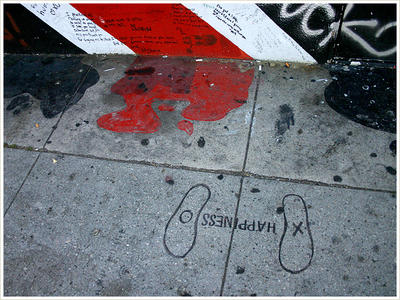10.31.2005
Amercan Girl boycott continues
The nutters are at it again: now a Catholic parish in Milwaukee has cancelled a fashion show by the makers of American Girl dolls because the company supports Girls Inc., an organization that is accused of including information about homosexuality and contraception in its broader girls-empowerment curriculum.
Republicans shoot down minimum wage hike
Not a single Democrat opposed raising the minimum wage from $5.15 an hour to $6.25, but all but four no votes in the Senate came from Republicans, who take home salaries of $162,100 plus benefits. Since the last time the minimum wage was increased, in 1997, Senators have boosted their own pay by $28,000 a year.
The language of landscape
 Toponymy is the taxonomic study of place names, and pfly has created a series of maps depicting language preferences in place names across the US. Using data from the Geographic Names Information System, the maps show regional uses of names that are essentially synonyms: lakes (orange) and ponds (blue), brooks and creeks, hollows and gulches, coulees and bayous, -bergs and -villes.
Toponymy is the taxonomic study of place names, and pfly has created a series of maps depicting language preferences in place names across the US. Using data from the Geographic Names Information System, the maps show regional uses of names that are essentially synonyms: lakes (orange) and ponds (blue), brooks and creeks, hollows and gulches, coulees and bayous, -bergs and -villes. (Via Information Aesthetics.)
10.30.2005
The art of selling (out?)
 Turner Prize–winning artist Keith Tyson decided to cut the crap, apparently, in a new sculpture on view at PaceWildenstein: openly and uncritically embracing commerce, he confirms any lingering suspicions with "a four-foot-high box covered in advertisements. Not irony-laden, clipped-from-a-newspaper collages like those made famous a century ago by Picasso and Braque, but real, bought-and-paid-for ads." He worked a deal with ad mogul Richard Kirshenbaum of Kirshenbaum Bond & Partners to sell ad space (to his agency's existing clients) on the sculpture. The fee, writes The New York Times, "is a secret, part of the mystery of the art."
Turner Prize–winning artist Keith Tyson decided to cut the crap, apparently, in a new sculpture on view at PaceWildenstein: openly and uncritically embracing commerce, he confirms any lingering suspicions with "a four-foot-high box covered in advertisements. Not irony-laden, clipped-from-a-newspaper collages like those made famous a century ago by Picasso and Braque, but real, bought-and-paid-for ads." He worked a deal with ad mogul Richard Kirshenbaum of Kirshenbaum Bond & Partners to sell ad space (to his agency's existing clients) on the sculpture. The fee, writes The New York Times, "is a secret, part of the mystery of the art.""My job is to make sure they're front and center with popular culture and having your brand show up in a museum or an art gallery is not exactly a bad thing," says Kirshenbaum.
So the cat's out of the bag, eh? Contemporary art—at least part of it—is a tool of commerce. Duh. For many, that's old news. As Artforum's editor-in-chief Tim Griffin told me in August, art is "ever more enmeshed in commerce":
That means commerce has moved toward art and art has moved toward commerce, or they're overlapping in a fashion that perhaps is still not so familiar to us. Certainly this is one of the reasons why branding becomes a subject of art: that is, one more way the commercial sphere in inscripted in art, which is a trope of the historic avant-garde. But whereas at one point you could have, as an avant-garde position, an outsider status, now the question that is so often hitting artists and writers is: what happens when there is no longer an outside? How do you end up creating some meaningful antagonisms or distances or modes of self-consciousness within this sphere where it no longer makes sense to say that there's an exterior alternative?Contributors to Frieze's October issue had some of the same questions. Conceptual artist Seth Siegelaub's diagnosis on "How Has Art Changed?":
The Economic Sphere: The art world has grown from a small specialized 'ghetto' to become an important economic-industrial sector with more of everything: artists, art school, art museums, art foundations, art galleries, art curators, art fairs, art auctions, art magazines, art gallery buildings, art advisers, art supply stores, artists' studios, art restaurants, art collectors, etc. It has become an important factor in urban planning and tourism.Back to Tyson's cubic billboard: sure, maybe it's an ironic critique of the encroachment of commercial influences in art (the title, Chameleon, could be read that way). But if it is, it doesn't strike me as very interesting art, and its subtle critique, amidst all that overtness, will be lost on the entertainment-minded art consumer. But that critique seems unlikely to me: to call on a friend who's also an art collector to broker sculptural product placement for his clients doesn't seem like the gesture of a critic. In the end, the piece feels like an inside joke, packaged for the nudge-nudge-wink-winkers of contemporary art. But anyone else will likely see it for what its appearances would suggest—a complete sellout.
The Social-Cultural Sphere: The contemporary art world ahs shifted from the periphery of capitalistic society to become a fully-fledged part of its growing entertainment sector, along with pop music, fashion and film, wiht the same models of 'stardom' and 'celebrity'.
The Artist: The artist has evolved from a 'bohemian' 'outsider' to become an almost 'respectable' 'liberal arts' profession and 'career.'
The Art: Art-making has metamorphosed from a primarioly 'critical' or aesthetic activity into a more or less acceptable form of mass entertainment as it has become a more marketable commodity and 'investment.'
The Museum: The museum has transformed itself from a private club to become a new type of mass-market cultural enterprise: blockbusters, bookshops, gift shops, restaurants, catering and party services, sponsorship, branding and property development ('speculation').
10.29.2005
Oil(y)men
 Despite a 1% reduction in oil production in the last 12 months, Exxon Mobil saw third-quarter profits soar 75% percent—to $10 billion. So while you and I pay through the nose for gas and heating oil, the world's biggest publicly traded oil company (and its shareholders) are seeing record-breaking profits? We're told that $60–70/gallon barrels of oil can be blamed on hurricane-damaged refineries and war in the Persian Gulf, but really it's about a bunch of greedy bastards demanding their cut. (The piglet shown here, Exxon Mobil CEO Lee Raymond, takes home $5.9 million—or five times that, by some estimates—per year.) That's nothing, compared to ConocoPhillips, a company run by a guy, James Mulva, who pulls in $5.8 million a year: they experienced 89 percent growth in the third quarter.
Despite a 1% reduction in oil production in the last 12 months, Exxon Mobil saw third-quarter profits soar 75% percent—to $10 billion. So while you and I pay through the nose for gas and heating oil, the world's biggest publicly traded oil company (and its shareholders) are seeing record-breaking profits? We're told that $60–70/gallon barrels of oil can be blamed on hurricane-damaged refineries and war in the Persian Gulf, but really it's about a bunch of greedy bastards demanding their cut. (The piglet shown here, Exxon Mobil CEO Lee Raymond, takes home $5.9 million—or five times that, by some estimates—per year.) That's nothing, compared to ConocoPhillips, a company run by a guy, James Mulva, who pulls in $5.8 million a year: they experienced 89 percent growth in the third quarter. The most perverse part of it all is: these "oil producers"—a misnomer that suggests they actually produce something rather than destroy natural habitats to remove and refine a collectively owned resource—get government subsidies to make all this oily cash. And thanks to the Republican Party, it just keeps getting better for rich oilmen: three months ago, they OK'd $14.5 billion in tax breaks for the energy industry, and last week they passed a measure giving oil companies more subsidies plus "federal insurance to oil refiners whose expansion projects are delayed by lawsuits or regulatory snags." Not surprisingly, the oil and gas industry donates 3-to-1 to Republicans, who raked in $138,204,929 in political contributions since 1990.
Seriously, folks, as the bumpersticker says, if you're not outraged, you're not paying attention. Either that or you one of the very few making a profit.
More: Read "Big Oil Protects its Interests: Industry spends hundreds of millions on lobbying, elections," a report by the Center for Public Integrity.
Automatic Zen
 I just stumbled upon this poetic work by Mona Hatoum, exhibited in the Arsenale at this year's Venice Biennale. It's called + and - and consists of a sand pit, a motor, and an aluminum propeller that's smooth on one side and serrated on the other. It's like a Japanese zen garden, only it's automated, so grooves are continuously and simultaneously created and erased.
I just stumbled upon this poetic work by Mona Hatoum, exhibited in the Arsenale at this year's Venice Biennale. It's called + and - and consists of a sand pit, a motor, and an aluminum propeller that's smooth on one side and serrated on the other. It's like a Japanese zen garden, only it's automated, so grooves are continuously and simultaneously created and erased.
Foreign accent syndrome?
At age 61, a woman born in Indiana had a stroke that left her speaking with a British accent, a mix between English cockney and West Country. When Tiffany Roberts regained her voice after as 1999 stroke, her accent changed, what doctors call "foreign accent syndrome." Now she says no one believes she's American born.
Rethinking folk.
 Skull Crash Helmet by Stuart (Sam) Hughes from the exhibition Folk Archive: Contemporary Popular Art from the UK, on view through November 13 at Kunsthalle Basel. Curated for the Barbican by Turner Prize winner Jeremy Deller and artist Alan Kane, the exhibition is less about folk art than contemporary culture, including objects leftover from protests, regional festival/competitions turned performance art, and ritual objects. More images and clips from a guided tour of the show by Deller here.
Skull Crash Helmet by Stuart (Sam) Hughes from the exhibition Folk Archive: Contemporary Popular Art from the UK, on view through November 13 at Kunsthalle Basel. Curated for the Barbican by Turner Prize winner Jeremy Deller and artist Alan Kane, the exhibition is less about folk art than contemporary culture, including objects leftover from protests, regional festival/competitions turned performance art, and ritual objects. More images and clips from a guided tour of the show by Deller here.
10.28.2005
Rosa and the Power of No.
 Having just discussed with my brother over dinner how bizarre America's lack of outrage is—at the bald-faced lies of the Bush Administration over the Plame leak, the clear deceptions over the Iraq war, the deaths of 2,000 GIs and wounding of 15,000 more, the desire by our president to give rich folks tax cuts when we're wallowing in unprecedented debt, and the ludicrous nomination of the obviously unqualified (but apparently exceedingly Christian) Harriet Miers for the highest court in the land—this feisty homage to Rosa Parks by the inimitable Greg Tate is somehow soothing. A taste:
Having just discussed with my brother over dinner how bizarre America's lack of outrage is—at the bald-faced lies of the Bush Administration over the Plame leak, the clear deceptions over the Iraq war, the deaths of 2,000 GIs and wounding of 15,000 more, the desire by our president to give rich folks tax cuts when we're wallowing in unprecedented debt, and the ludicrous nomination of the obviously unqualified (but apparently exceedingly Christian) Harriet Miers for the highest court in the land—this feisty homage to Rosa Parks by the inimitable Greg Tate is somehow soothing. A taste:Thanks to the Daily News' beyond-fabulous sepia-tone mug-shot memorial cover, Parks, the bespectacled seamstress–NAACP activist of 1955, is now officially a Thug Immortal, the original ride-or-die chick. So gangsta, so About The Black, she moved all the way to roughneck Detroit as Montgomery fast turned life-threatening. The News' cover choice has upset some in the cult-nat ranks, but I applaud it lest we forget the freedom road is paved with jailed revolutionaries and that liberation rhymes with incarceration when not death. Tain't but a hop, skip, and a jump from Parks to Angela and Assata on the FBI Most Wanted lists. And unlike the women of the Weather Underground who had to blow some shit up to get there, all these Black women had to do to register as threats to kracka supremacy was to make a federal case out of saying No.Read it all.
Powerline: Economy over ethics
If conservative blog Powerline is a representative voice of the right, it's pretty clear where the GOP's values sit: with money, not morality. A new post posits that the third-quarter economic growth rate of 3.8% is "of vastly more importance, in every way, than whatever indictments do or do not come out of Patrick Fitzgerald's grand jury." Funny, that logic didn't matter when Republicans impeached Clinton for perjury and obstruction of justice, despite a tenure marked by the addition of 18 million new jobs, the lowest unemployment rates in 30 years, and the lowest budget deficit in American history. Of course, Clinton's lies had nothing to do with launching a $203-billion war that's killed more than 2000 Americans on false grounds, as this case seems to be. Now that Bush insiders are facing indictment, perjury isn't such a grave crime. Sen. Kay Bailey Hutchinson, a Republican from Bush's home state, recently told Meet the Press, "I certainly hope that if there is going to be an indictment that says something happened, that it is an indictment on a crime and not some perjury technicality where they couldn't indict on the crime so they go to something just to show that their two years of investigation were not a waste of time and dollars." In her lengthy statement during a closed session on Clinton's articles of impeachment, she took a very different view: "I do not hold to the view of our Constitution that there must be an actual, indictable crime in order for an act of a public officer to be impeachable."
More fibbing? In a new National Journal piece, Murray Waas reports that "Vice President Cheney and his chief of staff, I. Lewis 'Scooter' Libby, overruling advice from some White House political staffers and lawyers, decided to withhold crucial documents from the Senate Intelligence Committee in 2004 when the panel was investigating the use of pre-war intelligence that erroneously concluded Saddam Hussein had weapons of mass destruction."
More fibbing? In a new National Journal piece, Murray Waas reports that "Vice President Cheney and his chief of staff, I. Lewis 'Scooter' Libby, overruling advice from some White House political staffers and lawyers, decided to withhold crucial documents from the Senate Intelligence Committee in 2004 when the panel was investigating the use of pre-war intelligence that erroneously concluded Saddam Hussein had weapons of mass destruction."
Bosnian pyramid
On the top of "Bosnian pyramid of Sun" was a temple, built by pre-Illyrians, people who lived, according to Osmanagic, 27,000 years ago.Watch a Reuters TV report at Politiken.tv.
Mr. Osmanagic thinks he will solve the "Bosnian pyramid of Sun" in the next five years, but also prove the existence of "Bosnian pyramid of Moon", lying under the neighboring hill of Križž.
10.27.2005
10.25.2005
Perilously inspired
 As a society, we're in deep dukkha. Roughly translated from Sanskrit, the term means "suffering," but Zen priest Steve Hagen eloquently likens it to "a wheel off kilter. If we think of this wheel as one that performs some important function, such as a potter's wheel, then the out-of-true wheel creates constant hardship for us every time we try to make a clay vessel." It's an apt diagnosis for times when the mis-centered glob of our environment, our economy, our political, religious, and even spiritual lives seems increasingly out of whack: while some of us can choose from a dozen kinds of branded, bottled water, almost a billion others dream of basic plumbing; while the armies of Islam and Christianity duke it out, real godlike compassion is a bloody casualty; with 86 percent of the world's resources being used up by its wealthiest 20 percent, the gulf between the "first" and "third" worlds expands. And while the ultra-rich happily acquire ever more, all the poorest can multiply is their numbers.
As a society, we're in deep dukkha. Roughly translated from Sanskrit, the term means "suffering," but Zen priest Steve Hagen eloquently likens it to "a wheel off kilter. If we think of this wheel as one that performs some important function, such as a potter's wheel, then the out-of-true wheel creates constant hardship for us every time we try to make a clay vessel." It's an apt diagnosis for times when the mis-centered glob of our environment, our economy, our political, religious, and even spiritual lives seems increasingly out of whack: while some of us can choose from a dozen kinds of branded, bottled water, almost a billion others dream of basic plumbing; while the armies of Islam and Christianity duke it out, real godlike compassion is a bloody casualty; with 86 percent of the world's resources being used up by its wealthiest 20 percent, the gulf between the "first" and "third" worlds expands. And while the ultra-rich happily acquire ever more, all the poorest can multiply is their numbers.But were the clay of humanity not fwapping perilously off balance, what would centeredness look like? A look at the prevailing values of American culture might give us an idea. On one hand, we’d frame it with noble poetry that obscures the grim fact of the global economy: our “peace and prosperity” comes at the expense of people we never see whose human or natural resources are tapped out on our behalf. On the other, the benchmarks of that center might be the keepers of our mainstream ethos (Ann Coulter, 50 Cent, Donald Rumsfeld, Toby "We'll put a boot in your ass, it's the American way" Keith among them) or our outsized obsessions (the Hummer, the Mall of America, the Atkins diet). Even if we take a less cynical viewpoint—that everyone should have a modicum of comfort, a car or two, a home, good education, healthcare, a lush lawn—we confront the unsustainability of the American dream. There simply aren’t enough resources to go around. By now it should be clear: America is centered on off-centered ideas.
So maybe our response to chaos should be counterintuitive. Rather than clinging to the stable and the known, we should embrace uncertainty. After all, how have we fared under leaders who trumpet their surety? With reassuringly straightforward English and boldly stated plans, they leveraged our fears to launch a war on the flimsiest of pretenses. But instead of getting the safety they promised, we've seen small-scale 9/11s in Bali, Baghdad, Madrid, London, Sharm el-Sheikh, and—where next? The war in Iraq has fanned the flames of jihad, turning Iraq, in the CIA's words, into the world's biggest training ground for the next generation of "professionalised" terrorists. Add to that the fact that, as Helen Keller wrote, "Security is mostly a superstition… Avoiding danger is no safer in the long run than outright exposure." If you’re unconvinced, consider the story of Nail Mahmoud, a 22-year old Palestinian man who was shot in the head and killed by unknown assailants at a surburban gas station outside St. Paul, Minnesota this past August. Would we feel more secure had he died in Gaza?
Instead of clinging to the false promise of safety, we should linger awhile in the uncomfortable realm of uncertainty. Because, as artists know, that’s where real innovation is born. In upheaval, often the shorthand of conventional wisdom, experience or tradition fails us and only a radical reassessment of the facts can save us. It’s not so much that precarity is a desirable long-term state where all answers can be found. But it’s what precariousness requires of us and inspires in us—vigilant awareness, heightened perception, a rare openness to risk—that equips us to approach today’s problems with creativity. Thrown for a loop, we become nudged out of complacency. As John Kenneth Galbraith wrote in The Affluent Society a half century ago, "These are days when men of all social disciplines and all political faiths seek the comfortable and the accepted; when the man of controversy is looked upon as a disturbing influence; when originality is taken to be a mark of instability; and when, in minor modification of the scriptural parable, the bland lead the bland." In chaos, that thinking won’t stand. If the upheaval of our times is ever to settle, lingering a bit longer in the discomfort may be preferable to clinging to those who disguise imbalance under a cloak of stability.
[My latest, from Adbusters #62, The Precarity Issue. Image: Leap into the Void (1960), Yves Klein, Harry Shunk, and John Kender]
10.24.2005
Rosa Parks is dead.
 "How she sat there, the time right inside a place so wrong it was ready," wrote Rita Dove of Rosa Parks. At 92, she's dead, and anyone dedicated to nonviolence and social justice, who knows that little people have to stand up—or sit down, as the case may be—to make a difference must mourn her passing.
"How she sat there, the time right inside a place so wrong it was ready," wrote Rita Dove of Rosa Parks. At 92, she's dead, and anyone dedicated to nonviolence and social justice, who knows that little people have to stand up—or sit down, as the case may be—to make a difference must mourn her passing.The Rosa & Raymond Parks Institute for Self-Development would be a nice place to send memorial donations.
 [image via]
[image via]
Katherine Kerstine Haiku contest winners announced
Last time I mentioned Star Tribune columnist Katherine Kersten it was for a column in which she blamed loose-moraled '60s types for gang crime. The Minneapolis weekly City Pages has decided to commemorate her conservative screeds with a haiku contest. An early entry responded to that column (which got me my one and only link from TalkLeft):
Back in the sixtiesNow, for the grand-prize winners:
I kept my legs together
and my eyes on God
First prize:
Being poor is fun.
Look what it did for Jesus:
condo in the sky!
Second prize:
Kinky Vikings are
all YOUR fault, fornicators!
Repent, culture fans!
Third prize:
Scold Vikings? Hardly.
Let's use logic of Limbaugh.
Throw flag at lefties.
White House v. The Onion
 How bizarre is this: the White House has sent a cease-and-desist letter to The Onion for using the presidential seal on its page of parodies of the president's weekly radio address. With all the scandals going on—and, oh yeah, a war—you'd think the Bush crowd would find other things more pressing. Although, maybe it's a ploy: like Bill Frist, maybe White House insiders bought stock in Onion, Inc., right before issuing the attorney's letter, one that's sure to put The Onion's radio spoofs (which I never knew about) on the map. I'm gonna use that seal too, in hopes it'll improve my site traffic.
How bizarre is this: the White House has sent a cease-and-desist letter to The Onion for using the presidential seal on its page of parodies of the president's weekly radio address. With all the scandals going on—and, oh yeah, a war—you'd think the Bush crowd would find other things more pressing. Although, maybe it's a ploy: like Bill Frist, maybe White House insiders bought stock in Onion, Inc., right before issuing the attorney's letter, one that's sure to put The Onion's radio spoofs (which I never knew about) on the map. I'm gonna use that seal too, in hopes it'll improve my site traffic.Update 10.28: The Onion responds, and it ain't pretty.
When concept trumps carving
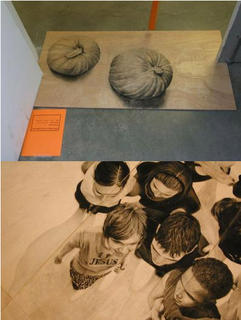 A "stereoscopic pumpkin polaroid camera." A chia pumpkin, sprouting grass, that's really an homage to a high-design chair. A Robert Gober-inspired pumpkin, mottled with terra cotta paint and violated by a sink drain. When my co-workers at the Walker Art Center carve pumpkins, they transcend mere carving. At Off Center, I just blogged on past entries into the staff pumpkin contest, which will be held again next Monday. The competition is fierce—desk nerds like me competing with people who know how to drywall and do electric wiring—and the results inevitably feature inside jokes, obscure art references, or examples of impressive construction work.
A "stereoscopic pumpkin polaroid camera." A chia pumpkin, sprouting grass, that's really an homage to a high-design chair. A Robert Gober-inspired pumpkin, mottled with terra cotta paint and violated by a sink drain. When my co-workers at the Walker Art Center carve pumpkins, they transcend mere carving. At Off Center, I just blogged on past entries into the staff pumpkin contest, which will be held again next Monday. The competition is fierce—desk nerds like me competing with people who know how to drywall and do electric wiring—and the results inevitably feature inside jokes, obscure art references, or examples of impressive construction work. Two favorites:
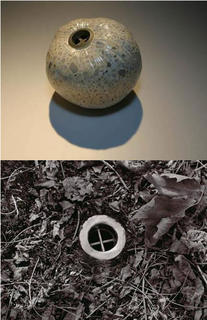 The Registration department's Dance Floor Pumpkin (top) takes inspiration from Jennifer Allora & Guillermo Calzadilla's Charcoal Dance Floor, a drawing of dancers whose images--and identies--blur as visitors pass over it (a critique of globalization, according to the artists).
The Registration department's Dance Floor Pumpkin (top) takes inspiration from Jennifer Allora & Guillermo Calzadilla's Charcoal Dance Floor, a drawing of dancers whose images--and identies--blur as visitors pass over it (a critique of globalization, according to the artists). Program Services created a pumpkin that took its cue from Robert Gober, fusing the type of sink drain seen in this untitled 1999 photograph with the Walker's terrazzo gallery floors (as seen in this 1997 Gober piece from the collection, which depicts a chair, a box of Kleenex, and a steel-plated drain).
For more, read the Off Center post, "The (conceptual) art of pumpkin carving."
10.23.2005
Wal-Mart's epiphany?
 Regular readers know I'm no fan of Wal-Mart. Its labor standards, artistic endeavors, or free-speech stances. So when they announced they're going to clean up their act (just in time for Wal-Mart Watch's "Higher Expectations Week," November 13–19, and the release of Robert "Outfoxed" Greenwald's new documentary The High Cost of Low Price), I was suspicious. But early indications seem promising: CEO Lee Scott says they'll be holding overseas factories to a higher standard and introducing more sustainable products, including a line of organic cotton clothing. The company is experimenting with renewable energy stores in Texas and Colorado. And, starting November 1, they'll begin the switch from petroleum-based to corn-based plastic packaging, a move that'll affectx 114 million clear-plastic containers for fruits and herbs. As WorldChanging asks, "What in Sam's name is going on here?"
Regular readers know I'm no fan of Wal-Mart. Its labor standards, artistic endeavors, or free-speech stances. So when they announced they're going to clean up their act (just in time for Wal-Mart Watch's "Higher Expectations Week," November 13–19, and the release of Robert "Outfoxed" Greenwald's new documentary The High Cost of Low Price), I was suspicious. But early indications seem promising: CEO Lee Scott says they'll be holding overseas factories to a higher standard and introducing more sustainable products, including a line of organic cotton clothing. The company is experimenting with renewable energy stores in Texas and Colorado. And, starting November 1, they'll begin the switch from petroleum-based to corn-based plastic packaging, a move that'll affectx 114 million clear-plastic containers for fruits and herbs. As WorldChanging asks, "What in Sam's name is going on here?"
10.22.2005
100,000 dead in Darfur and still no UN/US action.
This lede says it all:
MORE than 100,000 people are now believed to have died in the Darfur region of Sudan since the United Nations Security Council set a 30-day deadline last year for the Khartoum regime to begin to resolve the crisis in the area.Read more.
Art rock.
You know you're an art star when Calvin Tomkins profiles you in The New Yorker, but you're a cult figure when an obscure French band names a song after you. Behold: "The Rirkrit Tiravanija Song [mp3]," by Drugs Karaoke.
The New Nazi Youth
 Prussian blue is the color of residue left after the use of Zyklon B in Nazi concentration camps during World War II. But it's also the name of rising stars in the "racialist music scene," 13-year old twins Lamb and Lynx Gaede. These home-schooled MaryKate and Ashley wannabes use cuteness to candy-coat blunt racism, as demonstrated in the song "Aryan Man Awake":
Prussian blue is the color of residue left after the use of Zyklon B in Nazi concentration camps during World War II. But it's also the name of rising stars in the "racialist music scene," 13-year old twins Lamb and Lynx Gaede. These home-schooled MaryKate and Ashley wannabes use cuteness to candy-coat blunt racism, as demonstrated in the song "Aryan Man Awake":What will it take for you to remember your own folk? What will it take for you to break that heavy yoke? Why do you still cast your eyes downward to the ground? Worry lest what you say have prejudicial sound. Who will stand beside us when the war begins? Who will run and hide their heads and wait to see who wins? Who will face the end and watch a Valkyrie ride forth To join the gods and fallen stormtroopers of the North?Other songs include "Sacrifice" (a tribute to Rudlof Hess) and that German-language sensation "Weiss, weiss, weiss" (White, white, white). The good news—as this mp3 attests—is they absolutely suck. Which is why it's smart for them to have other attractions at their site, like... "Fashions of our European Heritage and Culture": dirndls and lederhosen. Sadly, no brown shirts.
[Update: TalkLeft has more: an interview with the Prussian Blue twins, a link to a fan-blog, and their email address.]
 Brownshirt babes: The Minneapolis-based National Socialist Movement, the neo-Nazi group at the center of riots in a north Toledo mixed-race neighborhood last weekend, wants your children: the Viking Youth Corps is now accepting applications. But before you let your kids apply, they must be of pure European stock and use no drugs or alcohol.
Brownshirt babes: The Minneapolis-based National Socialist Movement, the neo-Nazi group at the center of riots in a north Toledo mixed-race neighborhood last weekend, wants your children: the Viking Youth Corps is now accepting applications. But before you let your kids apply, they must be of pure European stock and use no drugs or alcohol. (Via MNSpeak. Bottom photo of Nazis in Toledo, October 15, by Isis.)
10.20.2005
Smilin' Tom!
 In his police mug shot, Tom DeLay seems to be "the happiest accused felon in our nation's history."
In his police mug shot, Tom DeLay seems to be "the happiest accused felon in our nation's history."
If art was a crime scene...
 Officers at the NYPD are honing their police skills through an unusual medium: fine art. As this CBS News video reports, detectives in the department, with the help of curator Amy Herman, are analyzing masterworks in The Frick Collection to better suss suspects, analyze crime scenes, and improve their observational abilities. After their art appreciation session, they apply the skills to photos of NYC street scenes.
Officers at the NYPD are honing their police skills through an unusual medium: fine art. As this CBS News video reports, detectives in the department, with the help of curator Amy Herman, are analyzing masterworks in The Frick Collection to better suss suspects, analyze crime scenes, and improve their observational abilities. After their art appreciation session, they apply the skills to photos of NYC street scenes.Morgan at the Walker applies the exercise to work that's more contempory than the Bellinis used by the NYPD. Like Jake and Dinos Chapman's Year Zero: "Juvenile delinquents! These youngsters are proud and defiant, and clearly in violation of public nudity statutes." Ironically, the sculpture was inspired by a crime scene—atrocities commited by Napoleon's armies during the occupation of Spain, as documented by Francisco de Goya in his Disasters of War etchings.
Weird wheels for the wheelchair-bound.
 I'm always a bit suspicious of sites that claim to curate "cool," but The Cool Hunter seems to have delivered with a new product for eco-minded disabled drivers—the Hungarian-made Kenguru, a stylish, compact, electric car for wheelchair-bound drivers. Designed by Rehab Rt., the car was nominated for a 2005 INDEX Award. The coolest part:
I'm always a bit suspicious of sites that claim to curate "cool," but The Cool Hunter seems to have delivered with a new product for eco-minded disabled drivers—the Hungarian-made Kenguru, a stylish, compact, electric car for wheelchair-bound drivers. Designed by Rehab Rt., the car was nominated for a 2005 INDEX Award. The coolest part:The car’s interior space has no front seat—just a space built to house the driver’s own wheelchair so all he/she has to do is simply roll in through the extra large car doors and into position. The wheelchair locks into place, within easy reach of the car’s controls which are centred around a joystick.WorldChanging has more.
(Thanks for the tip, Lisa.)
Katrina tattoos.
 Just as survivors of last winter's Indian Ocean tsunami commemorated the event with tattoos, some who witnessed Hurricane Katrina are using skin art to recall the event. What's up with that? Is it akin to the conqueror's flag raised atop the vanquished enemy's castle—"I prevailed!"—or the explorer's pennant on the peak of Everest? Or more like a band's tour t-shirt—"I was there."—more of a message to others than to the wearer? Tattoos (or other body modifications) often signal rites of passage: as lore has it, sailors would get a swallow tattooed on their arm for every 5,000 miles sailed, and after 9/11, tattoo artists put eagles and flags on a lot of shoulders. Rufus Camphausen, author of Return of the Tribal: A Celebration of Body Adornment, says body art is "a way to identify who we are in a world that has lost its sense of community"—in this case, the community of shared trauma and triumph over adversity. But people interviewed by Reuters suggest it's just about gratitude for being alive. One woman got a line from "Cabaret" inked on her arm: "In here, life is beautiful," which contrasts the chaos of Weimar-era Berlin that gave the musical its context—something she sees as fitting today. I understand the sentiment, but for me, a simple pinch will do.
Just as survivors of last winter's Indian Ocean tsunami commemorated the event with tattoos, some who witnessed Hurricane Katrina are using skin art to recall the event. What's up with that? Is it akin to the conqueror's flag raised atop the vanquished enemy's castle—"I prevailed!"—or the explorer's pennant on the peak of Everest? Or more like a band's tour t-shirt—"I was there."—more of a message to others than to the wearer? Tattoos (or other body modifications) often signal rites of passage: as lore has it, sailors would get a swallow tattooed on their arm for every 5,000 miles sailed, and after 9/11, tattoo artists put eagles and flags on a lot of shoulders. Rufus Camphausen, author of Return of the Tribal: A Celebration of Body Adornment, says body art is "a way to identify who we are in a world that has lost its sense of community"—in this case, the community of shared trauma and triumph over adversity. But people interviewed by Reuters suggest it's just about gratitude for being alive. One woman got a line from "Cabaret" inked on her arm: "In here, life is beautiful," which contrasts the chaos of Weimar-era Berlin that gave the musical its context—something she sees as fitting today. I understand the sentiment, but for me, a simple pinch will do.
Which zone?
 ThinkProgress posts this unaltered screen-shot from yesterday's Today show interview with Bill O'Reilly. Legitimate typo or editorializing?
ThinkProgress posts this unaltered screen-shot from yesterday's Today show interview with Bill O'Reilly. Legitimate typo or editorializing?
10.19.2005
Powell aide: Cheney cabal "hijacked" foreign policy
 From the Financial Times:
From the Financial Times:Vice-President Dick Cheney and a handful of others had hijacked the government's foreign policy apparatus, deciding in secret to carry out policies that had left the US weaker and more isolated in the world, the top aide to former Secretary of State Colin Powell claimed on Wednesday.More.
In a scathing attack on the record of President George W. Bush, Colonel Lawrence Wilkerson, chief of staff to Mr Powell until last January, said: “What I saw was a cabal between the vice-president of the United States, Richard Cheney, and the secretary of defense, Donald Rumsfeld, on critical issues that made decisions that the bureaucracy did not know were being made.
“Now it is paying the consequences of making those decisions in secret, but far more telling to me is America is paying the consequences.”
DeLayed gratification.
 It's a beautiful thing, isn't it, Tom DeLay's arrest warrant, issued today? Now I'm waiting for The Smoking Gun to post mug shots whenever this above-the-law moralizer gets photographed and printed.
It's a beautiful thing, isn't it, Tom DeLay's arrest warrant, issued today? Now I'm waiting for The Smoking Gun to post mug shots whenever this above-the-law moralizer gets photographed and printed.
Dear George, you lied.
It turns out George Bush knew Karl Rove leaked Valerie Plame's name, despite assurances to the contrary. (Let's see if he's also lying about whether he'll fire the leaker, as previously stated.) Sen. Chuck Shumer writes a letter to Bush, urging him to—at last—come clean about what Rove said, how often the two spoke on the topic, and why the president didn't suspend the security clearance of someone who exposed the identity of a covert agent. More excellent coverage from Josh Marshall.
This just in: the sky isn't falling. Much.
9/11, the London Tube bombing, tsunamis, Hurricane Katrina, cholera epidemics in Guinea-Bissau, polio in Minnesota, avian flu, dog flu, the inevitability of a major human pandemic coming soon. The world is freakin' scary these days. But maybe we can take comfort in Helen Keller's words:
According to the Human Security Report, there's no reliable data suggesting the world is more violent. The actual number of wars, deaths through wars, and violent conflicts has decreased, the report finds.
Of course, the US federal government seems utterly unprepared—Katrina-style unprepared—should an avian flu outbreak hit the US. So start your worrying there.
Security is mostly a superstition. It does not exist in nature, nor do the children of men as a whole experience it. Avoiding danger is no safer in the long run than outright exposure. Life is either a daring adventure or nothing.Or, better yet, this: your fears—at least those about war and violence—are not based in reality.
According to the Human Security Report, there's no reliable data suggesting the world is more violent. The actual number of wars, deaths through wars, and violent conflicts has decreased, the report finds.
Of course, the US federal government seems utterly unprepared—Katrina-style unprepared—should an avian flu outbreak hit the US. So start your worrying there.
Sydney Morning Herald: US troops burn Taliban bodies
The Sydney Morning Herald reports that "US soldiers in Afghanistan burnt the bodies of dead Taliban and taunted their opponents about the corpses, in an act deeply offensive to Muslims and in breach of the Geneva conventions," according to a news program that captured the act in footage to be aired in Australia tonight. Makes you wonder what Condi Rice means when she says she wants to follow the "Afghan Model" in Iraq.
(Via Cursor.)
(Via Cursor.)
Headlines
Some quick links:
Creationists use star power: One way to up the legitimacy of "intelligent design" is to expand the definition of a scientific theory—to include astrology!
Bomb the hippies: On the same day antiwar marchers amassed in Washington DC, a half dozen bioterror sensors indicated high quantities of the deadly bacteria francisella tularensis concentrated around demonstration sites. Sploid ponders a very serious question: "Did Washington 'test' bioweapons on war protesters?"
Tears of a clown: Decrying the haters, chronic mudslinger Bill O'Reilly says the climate is America has changed, and it's hard on him: "Now it's so bad that I spend an enormous amount of money protecting myself against evil."
How corrupt is your country? Mine is the 17th least corrupt, according to Transparency International's 2005 Corruption Perceptions Index, which puts Chad and Bangladesh in a dead heat for most corrupt.
Good dog! The namesake of my border collie, lingust and activist Noam Chomsky, beat out Umberto Eco, Richard Dawkins, and Vaclav Havel to be voted world's top public intellectual by Prospect and Foreign Policy magazines.
Arrest warrants issued for US troops: When US troops shelled Baghdad's Palestine Hotel, well known as housing for international journalists, Spanish cameraman Jose Couso lost his life. Now a judge in Spain has issued an arrest warrant for Sgt. Shawn Gibson, Capt. Philip Wolford, and Lt. Col. Philip de Camp, crew members of the tank that killed Couso. Whether the Bush administration will allow true justice to prevail in Iraq is another matter...
More to come...
Creationists use star power: One way to up the legitimacy of "intelligent design" is to expand the definition of a scientific theory—to include astrology!
Bomb the hippies: On the same day antiwar marchers amassed in Washington DC, a half dozen bioterror sensors indicated high quantities of the deadly bacteria francisella tularensis concentrated around demonstration sites. Sploid ponders a very serious question: "Did Washington 'test' bioweapons on war protesters?"
Tears of a clown: Decrying the haters, chronic mudslinger Bill O'Reilly says the climate is America has changed, and it's hard on him: "Now it's so bad that I spend an enormous amount of money protecting myself against evil."
How corrupt is your country? Mine is the 17th least corrupt, according to Transparency International's 2005 Corruption Perceptions Index, which puts Chad and Bangladesh in a dead heat for most corrupt.
Good dog! The namesake of my border collie, lingust and activist Noam Chomsky, beat out Umberto Eco, Richard Dawkins, and Vaclav Havel to be voted world's top public intellectual by Prospect and Foreign Policy magazines.
Arrest warrants issued for US troops: When US troops shelled Baghdad's Palestine Hotel, well known as housing for international journalists, Spanish cameraman Jose Couso lost his life. Now a judge in Spain has issued an arrest warrant for Sgt. Shawn Gibson, Capt. Philip Wolford, and Lt. Col. Philip de Camp, crew members of the tank that killed Couso. Whether the Bush administration will allow true justice to prevail in Iraq is another matter...
More to come...
Plow art.
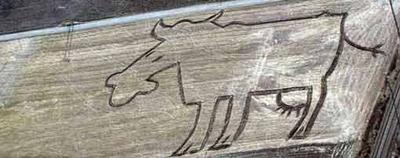 Reminiscent of the Japanese rice-field art mentioned awhile back, this field is what resulted when a Norwegian farmer's daughter chucked her sketch pad for a larger canvas. The plow art is just one of her "Animals I Have Known" series, a reference to a Cora Sandel book, that also includes a cow, a pony, and a pig. More at Sponbustion.
Reminiscent of the Japanese rice-field art mentioned awhile back, this field is what resulted when a Norwegian farmer's daughter chucked her sketch pad for a larger canvas. The plow art is just one of her "Animals I Have Known" series, a reference to a Cora Sandel book, that also includes a cow, a pony, and a pig. More at Sponbustion. (Via W-M-M-N-A.)
Definition: Paranoid Schizophrenia
In an email entitled, simply, "Bush," Pete sends a definition:
Schizophrenia (SKITS-oh-FREEN-ee-uh)---one of the most damaging of all mental disorders---causes its victims to lose touch with reality. They often begin to hear, see, or feel things that aren't really there (hallucinations) or become convinced of things that simply aren't true (delusions). In the paranoid form of this disorder, they develop delusions of persecution or personal grandeur. The first signs of paranoid schizophrenia usually surface between the ages of 15 and 34. There is no cure, but the disorder can be controlled with medications. Severe attacks may require hospitalization.
The truthiness of creationism.
 Steven Colbert—formerly of the Daily Show, now with his own gig—lays into the reality-based community in a segment on "truthiness": saying that he doesn't trust books (they're elitist) "because they're all facts and no heart," he hilariously satirizes a country divided into "those who think with their heads and those who know with their hearts." Of course, he's talking about Bush's nomination of Harriet Miers and the rationale for war in Iraq, but he's pointing out a bigger issue that's exemplified by advocates of creationism (spun by the religious right as "intelligent design").
Steven Colbert—formerly of the Daily Show, now with his own gig—lays into the reality-based community in a segment on "truthiness": saying that he doesn't trust books (they're elitist) "because they're all facts and no heart," he hilariously satirizes a country divided into "those who think with their heads and those who know with their hearts." Of course, he's talking about Bush's nomination of Harriet Miers and the rationale for war in Iraq, but he's pointing out a bigger issue that's exemplified by advocates of creationism (spun by the religious right as "intelligent design").Consider Kent Hovind. He runs a nonprofit organization called Creation Science Evangelism. I should put Dr. in front of his name because he got his Ph.D. through Patriot Bible University, an unaccredited correspondence school (widely considered a diploma mill) that believes "in the historical accuracy of all Biblical accounts including: special creation as it occurred during six literal days, the existence of Adam and Eve as the progenitors of all people, the fall and resultant divine curse on creation, and the worldwide flood" and "in the bodily return of Christ to establish His literal eternal Kingdom." Not to be confused with the other fundamentalist Christian lizard guy, G. Thomas Sharp, Hovind's claim to fame of late—aside from founding Dinosaur Adventure Land and running an e-commerce site that has sold anti-Semitic books like Fourth Reich of the Rich and has recommended The Protocols of the Elders of Zion—is his $250,000 offer:
Formerly $10,000 offered since 1990Of course, Hovind isn't offering a prize to anyone who can provide "empirical evidence" to "prove beyond reasonable doubt" concepts like the holy trinity or the divinity of Christ, the verifiability of the virgin birth or that God created the earth in six days (although his dinosaur theme park and videos make that claim). His contest, like the rest of his site, is couched in rationally presented, bullet-pointed outlines and faux scientific method, buttressed by replica dinosaur bones (for sale: a replica Tyrannosaurus Rex Tooth with Root has been marked down, from $25 to $18!), but his claims are utterly unsupported by scientists not working under the banner of Christianity.
I have a standing offer of $250,000 to anyone who can give any empirical evidence (scientific proof) for evolution.* My $250,000 offer demonstrates that the hypothesis of evolution is nothing more than a religious belief...
How to collect the $250,000:
Prove beyond reasonable doubt that the process of evolution (option 3 above, under "known options") is the only possible way the observed phenomena could have come into existence. Only empirical evidence is acceptable. Persons wishing to collect the $250,000 may submit their evidence in writing or schedule time for a public presentation. A committee of trained scientists will provide peer review of the evidence offered and, to the best of their ability, will be fair and honest in their evaluation and judgment as to the validity of the evidence presented...
There are plenty of other red flags with Hovind—he's evaded taxes repeatedly, the IRS reportedly raided his office last year to confiscate financial records, and his Ph.D. thesis was notoriously bad and largely unsourced—but what's most curious is his tactic, the same one used by his more mainstream cohorts in Washington: the least credible arguments are heralded, again and again, as truth, leaving those who have credibility to go on the defensive about things—WMDs, Miers' lack of qualifications, FEMA's blundering of hurricane relief, the scientific probability of evolution—that already have mountains of evidence to back them up. Maybe Colbert's fake-news guy is the perfect voice for this syndrome. He concluded his segment, "The truthiness is: anyone can read the news to you; I promise to feel the news at you."
10.18.2005
In the eye of the beholder
 This is what I first saw when I glanced at a telephone pole on 31st and Hennepin in Uptown Minneapolis the other day. A nice street-art project, I thought. A simple intervention that reminds us to live a verdant life, to embrace lushness and welcome abundance--and even tear a piece off. Or something.
This is what I first saw when I glanced at a telephone pole on 31st and Hennepin in Uptown Minneapolis the other day. A nice street-art project, I thought. A simple intervention that reminds us to live a verdant life, to embrace lushness and welcome abundance--and even tear a piece off. Or something.Of course, I was a little skeptical: is this an ad for a band or a day spa? Am I being suckered by a buzz marketing campaign, some scheme to be paid off, eventually, by an ad for malt liquor?
I went back, this time with plenty of time and a camera. Here’s what I found.
 Not sure which interpretation I prefer.
Not sure which interpretation I prefer.[Cross-posted at Off Center.]
Darwin's Nightmare
This effect had an unlikely cause: as an experiment in the '60s, Nile perch were introduced into Tanzania's Lake Victoria and wiped out local fish populations. While people living near the lake languished on the brink of starvation, a booming export market for the fish emerged, bringing with it the byproducts of globalization—factories, guns, and corrupt trade officials. Sauper writes, "I tried to transform the bizarre success story of a fish and the ephemeral boom around this 'fittest' animal into an ironic, frightening allegory for what is called the New World Order. I could make the same kind of movie in Sierra Leone, only the fish would be diamonds, in Honduras, bananas, and in Libya, Nigeria or Angola, crude oil." The winner of more than a dozen film prizes, including the 2004 European Film Award for Best Documentary, Darwin's Nightmare was praised by New York Times critic A.O. Scott as "an extraordinary work of visual journalism, a richly illustrated report on a distant catastrophe that is also one of the central stories of our time."
More at the Walker Film blog.
10.17.2005
Religion, politics, and the plot against America
 I'm finally reading Phillip Roth's latest novel, The Plot Against America, which imagines an America lead by Nazi sympathizer Charles Lindbergh instead of third-termer FDR. It's a chilling read with spooky parallels to today.
I'm finally reading Phillip Roth's latest novel, The Plot Against America, which imagines an America lead by Nazi sympathizer Charles Lindbergh instead of third-termer FDR. It's a chilling read with spooky parallels to today. Fritz Stern's In These Times essay "A Fundamental History Lesson" arrived in my inbox yesterday, minutes after setting Roth's book down. Stern was a boy growing up in Germany during Hitler's rise to power, so his look at how the mix of religion and politics in Germany's National Socialism movement paved the way for Nazi fascism is particularly credible and powerful—and eerily apropos of Roth's novel. As with Bush's frequent photo-ops, Roth's Lindbergh wins the presidency by flying the Spirit of St. Louis to every state in the union—and whenever any political problem arises, he resorts to the same image-rich, content-free fix—and, like Bush, Lindbergh (and Hitler) envokes God's name and denounces immoral liberalism at every turn. Stern writes:
Let’s consider not the banality of evil but its triumph in a deeply civilized country. After the Great War and Germany’s defeat, conditions were harsh and Germans were deeply divided between moderates and democrats on the one hand and fanatic extremists of the right and the left on the other. National Socialists portrayed Germany as a nation that had been betrayed or stabbed in the back by socialists and Jews; they portrayed Weimar Germany as a moral-political swamp; they seized on the Bolshevik-Marxist danger, painted it in lurid colors and stoked people’s fear in order to pose as saviors of the nation. In the late ’20s a group of intellectuals known as conservative revolutionaries demanded a new volkish authoritarianism, a Third Reich. Richly financed by corporate interests, they denounced liberalism as the greatest, most invidious threat, and attacked it for its tolerance, rationality and cosmopolitan culture. These conservative revolutionaries were proud of being prophets of the Third Reich—at least until some of them were exiled or murdered by the Nazis when the latter came to power. Throughout, the Nazis vilified liberalism as a semi-Marxist-Jewish conspiracy and, with Germany in the midst of unprecedented depression and immiseration, they promised a national rebirth.As Plot reaches its climax, Lindbergh disappears, anti-Semitic rioting ensues, and the vice president—an even bigger fascist than the prez—starts locking up Democrats and progressives, all in the name of national security. Anyone drawing parallels between today's cultural/political climate and those conditions Hilter capitalized on to take power run the risk of being accused of comparing Bush to Hitler. So I'll just compare the conditions that gave rise to Hitler to Roth's fictionalized account of those times. With that out, I ask: isn't this all vaguely familiar? The national crisis of 9/11 has paved the way for many amendments to the law previously unimaginable: detainment without charge or legal representation, state-sponsored "torture," erosion of civil rights, leveraging fears through a color-coded terror threat level indicator that's likely triggered not by increased threats but political events.
Roth's is a potent novel, one I'm not finished with and have barely had time to process, and I'd love to hear reader's thoughts on it.
10.16.2005
Sleepwalker explained.
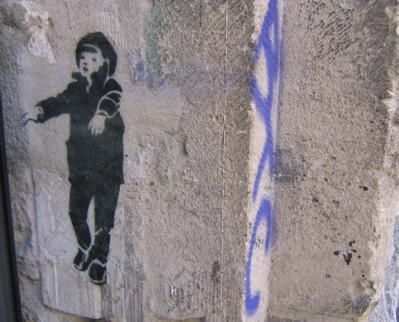 BlogYourMind also offers an explanation of this shot of street art I took outside Kunsthaus Tacheles in Berlin. The image, from the cover of a Sigur Ros album, is borrowed from a John Yang photo called Blindman's Bluff.
BlogYourMind also offers an explanation of this shot of street art I took outside Kunsthaus Tacheles in Berlin. The image, from the cover of a Sigur Ros album, is borrowed from a John Yang photo called Blindman's Bluff.
Parasitic Advertising
 "mleak" captured insects and painted corporate logos on them in a project she calls "Parasitic Advertising." (Via BlogYourMind.)
"mleak" captured insects and painted corporate logos on them in a project she calls "Parasitic Advertising." (Via BlogYourMind.)
TinkyWinky, SpongeBob, Buster and... American Girl?
 Rightwing conservatives are taking aim at another cuddly, innocuous childhood icon, the popular American Girl dolls (and not because, in this picture, she looks so French). The American Family Association is urging a boycott of the manufacturer of the dolls because it donates to Girls Inc., a "youth organization dedicated to inspiring all girls to be strong, smart, and bold... [and to] confront subtle societal messages about their value and potential, and prepare them to lead successful, independent, and fulfilling lives." But conservatives know it's really "a pro-abortion, pro-lesbian advocacy group."
Rightwing conservatives are taking aim at another cuddly, innocuous childhood icon, the popular American Girl dolls (and not because, in this picture, she looks so French). The American Family Association is urging a boycott of the manufacturer of the dolls because it donates to Girls Inc., a "youth organization dedicated to inspiring all girls to be strong, smart, and bold... [and to] confront subtle societal messages about their value and potential, and prepare them to lead successful, independent, and fulfilling lives." But conservatives know it's really "a pro-abortion, pro-lesbian advocacy group." "Parents need to know that this effort to promote self-esteem among girls is not as innocent as it seems," says Ann Scheidler, head of The Pro-Life Action League. "While Girls Inc. has some good programs, they also support abortion, oppose abstinence-only education for girls, and condone lesbianism."
10.15.2005
Media Citizen: "Soldier Propagandist"
More on flaks planted at Bush's allegedly "spontaneous" teleconference with troops stationed in Iraq: in addition to a paid publicity officer posing as a combat soldier, the group included a soldier with a remarkable track record of getting pro-Bush quotes in print. Read Media Citizen's "Soldier Propagandist."
Baby's Got Back v. Gin & Juice
John Coulton's folksy version of "Baby's Got Back" (kind of a John Denver-meets-Sir Mix-a-Lot thing) is good. But is it Gourds/"Gin & Juice" good?
Lost in translation.
 Richard, a British expatriate who heads up the computer department at a school in Samut Prakan, Thailand, writes that during summer school kids can wear whatever they like to school. But during a visit by a foreigner, one girl discovered how offensive her shirt, written in English, was.
Richard, a British expatriate who heads up the computer department at a school in Samut Prakan, Thailand, writes that during summer school kids can wear whatever they like to school. But during a visit by a foreigner, one girl discovered how offensive her shirt, written in English, was.
House of Oracles
 Amerigo Vespucci (2003)
Amerigo Vespucci (2003)The first ever retrospective of works by Chinese-born, Paris-based artist Huang Yong Ping opens at the Walker tomorrow. Called House of Oracles: A Huang Yong Ping Retrospective, it's an exciting show, for me anyway, because it combines Eastern philosophy with Western avant-garde practices, intricate nuanced works with incredible large-scale sculptures, meditative pieces with work critical of global superpowers: a harbinger of colonialism's end in the form of a two-ton elephant attacked by a tiger; an E-3 spy plane partially reconstructed in the gallery, a gladiatorial arena for live bugs and lizards; recently occupied lion cages (marked with signs seen at passport control at the airport); a giant sandcastle shaped like the former Hongkong and Shanghai Banking Corporation building, and more.
 11 June 2002–The Nightmare of George V (2002)
11 June 2002–The Nightmare of George V (2002) Bank of Sand, Sand of Bank (2000/2005)
Bank of Sand, Sand of Bank (2000/2005)
Hoodies for the surveillance era.

(Via Leigha, who ties it to this weekend's run of the performance of SUPER VISION by the Builder's Association at the Walker Art Center.)
UN official: US starves Iraqis in "flagrant violation" of international law
 According to Jean Ziegler, a Swiss-born human rights inspector for the UN, "A drama is taking place in total silence in Iraq, where the coalition's occupying forces are using hunger and deprivation of water as a weapon of war against the civilian population." The US denies the charges, which Ziegler calls "a flagrant violation of international law."
According to Jean Ziegler, a Swiss-born human rights inspector for the UN, "A drama is taking place in total silence in Iraq, where the coalition's occupying forces are using hunger and deprivation of water as a weapon of war against the civilian population." The US denies the charges, which Ziegler calls "a flagrant violation of international law."In other Iraq news:
• The Village Voice reports that one of the soldiers participating in Bush's staged teleconference with troops in Iraq was actually a press flak, Master Sgt. Corine Lombardo. Media Citizen writes that Lombardo often appears in the mainstream media, but, as was the case in Bush's event, she's not always identified as a public affairs officer who is a direct spokesperson to the media.
• The US claims it intercepted a letter between senior al-Qaeda officials Ayman al-Zawahiri and Abu Musab al-Zarqawi. The timing of the letter's release (days before today's vote on the Iraqi constitution) and its content (points that directly justify the Bush administration's continuing war in Iraq) seem fishy. But al-Qaida's accusation that the Pentagon faked the letter isn't so convincing. But now other credible scholars in the US are questioning its authenticity. Among his doubts, Stephen Ulph of the Jamestown Foundation says its odd for two top al-Qaeda leaders to overtly spell out ideas that are common knowledge among mujahideen. And professor/Middle East expert Juan Cole questions terminology unlikely to be used by a Sunni like al-Zawahiri. Most glaring, though, is that US intelligence officials can't (or won't) discuss how they obtained the letter and what criteria they used to determine its authenticity.
10.14.2005
Bush to Blair: Who's next?
A note jotted by a British foreign policy adviser during a January 30, 2003, meeting reveals that George W. Bush told Tony Blair he planned on targeting other countries after the attack on Iraq, according to The Guardian. The who's-next list has some obvious victims--Iran, North Korea, and Pakistan--but one standout, Saudi Arabia, whom Bush implied was developing WMDs.
Landmine-detecting plants.
 Via Digg, a way-too-brief blurb on the development of genetically modified plants that can detect landmines. The company Aresa Biodection says plants would "change colour from green to red when growing nearby specific compounds. Hence, detection of various compounds in the environment is possible without using sophisticated detection methods and devices."
Via Digg, a way-too-brief blurb on the development of genetically modified plants that can detect landmines. The company Aresa Biodection says plants would "change colour from green to red when growing nearby specific compounds. Hence, detection of various compounds in the environment is possible without using sophisticated detection methods and devices."Update: Regine sends a link that better explains the plant, Thale Cress (Arabidopsis thaliana), and includes pictures of its color change. As Gizmag writes, Thale Cress makes its color change within 3 to 5 weeks of planting and can be used to detect not only landmines (of which there are around 100 million in the ground and active today), but unexploded ordnances and heavy metals in polluted soil.
Apple's White Power
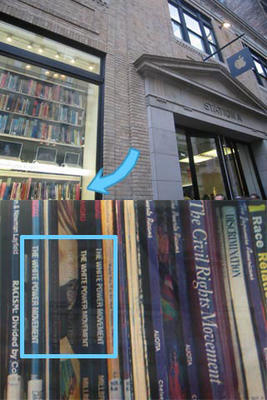 Now how'd that happen? Gothamist reports on an Apple Store in Soho that has a window display showing a loaded bookshelf. Among the titles visible on the books is one called "The White Power Movement." While it's described as "A horrifying account of the Ku Klux Klan and other racist hate groups (such as skinheads) in the U.S..." it's still a surprise for a purveyor of sleek, uniform, and white gadgets.
Now how'd that happen? Gothamist reports on an Apple Store in Soho that has a window display showing a loaded bookshelf. Among the titles visible on the books is one called "The White Power Movement." While it's described as "A horrifying account of the Ku Klux Klan and other racist hate groups (such as skinheads) in the U.S..." it's still a surprise for a purveyor of sleek, uniform, and white gadgets.
How do you say "D'oh!" in Arabic?
The Raw Story reports that Middle Eastern satellite TV station MBC is launching an Arabized version of The Simpsons:
"Omar Shamshoon," as he is called on the show, looks like the same Homer Simpson, but he has given up beer and bacon, which are both against Islam, and he no longer hangs out at "seedy bars with bums and lowlifes." In Arabia, Homer's beer is soda, and his hot dogs are barbequed Egyptian beef sausages. And the donut-shaped snacks he gobbles are the traditional Arab cookies called kahk.
--snip--
Some longtime "Simpson" fans who are Arabs are incensed over the Arabized version. "This is just beyond the pale," wrote As'ad AbuKhalil, a professor at California State University, Stanislaus, whose blog, angryarab blogspot, often touches on politics and the media. After viewing a promotional segment of "Al Shamshoon," Prof. AbuKhalil wrote, "It was just painful....The guy who played Homer Simpson was one of the most unfunny people I ever watched. Just drop the project, and air reruns of Tony Danza's show instead."
Monkmobiles and bulletproof robes
 Separatists in southern Thailand—a region that up until Thailand's annexation in 1902 was semi-autonomous, Malay, and largely Muslim—have increased violence against the Thai Buddhist majority in recent years, targeting more and more Buddhist monks and teachers. A recent terror tactic, writes the Observer Research Foundation, is "for two terrorists to travel in a two-wheeler and for the one in the rear to take out a weapon and kill the target. This helps in rapid get-away after the killing without being captured by the bystanders or the police." As a result, new products are being developed to protect Buddhist monks, from bulletproof vests in the traditional saffron hue to motorcycle sidecars—dubbed "monkmobiles"— encased in protective glass and outfitted with a small window for receiving alms.
Separatists in southern Thailand—a region that up until Thailand's annexation in 1902 was semi-autonomous, Malay, and largely Muslim—have increased violence against the Thai Buddhist majority in recent years, targeting more and more Buddhist monks and teachers. A recent terror tactic, writes the Observer Research Foundation, is "for two terrorists to travel in a two-wheeler and for the one in the rear to take out a weapon and kill the target. This helps in rapid get-away after the killing without being captured by the bystanders or the police." As a result, new products are being developed to protect Buddhist monks, from bulletproof vests in the traditional saffron hue to motorcycle sidecars—dubbed "monkmobiles"— encased in protective glass and outfitted with a small window for receiving alms.  Many of the products are devised by "Thailand's Q" (a reference to James Bond's gadget guy), Major Songphon Eiamboonyarith, a defense contractor who has also invented bulletproof tuk-tuks (motorcycle taxis), "umbrellas that shoot rubber bullets, bullet-proof baseball caps and a hand-held device to fire a man-sized net 30 feet (10 m) to stop a villain in his tracks."
Many of the products are devised by "Thailand's Q" (a reference to James Bond's gadget guy), Major Songphon Eiamboonyarith, a defense contractor who has also invented bulletproof tuk-tuks (motorcycle taxis), "umbrellas that shoot rubber bullets, bullet-proof baseball caps and a hand-held device to fire a man-sized net 30 feet (10 m) to stop a villain in his tracks."And for the non-monk: Wired reports on Colombian designer Miguel Caballero's ready-to-wear clothing--trench coats, suits, denim jackets, t-shirts--that can stop a 9mm slug.
10.13.2005
How does Scott McClellan sleep at night?
Wow. At today's (rather huffy) press gaggle, Scott McClellan covered the main talking points, and some odd ones: He invoked 9/11 as justification for Iraq, accused Helen Thomas of being "opposed to the broader war on terrorism," used the phrase "a free democratic Iraq in the heart of the Middle East" three times in one answer, and deflected questions about Bush's choreographed troop talk.
The media steps up: a blundered photo-op
 I just finished an article for the next issue of Adbusters called "Unmediate yourself." It's inspired by Harper's contributing editor Thomas de Zengotita's book Mediated as well as those amazing moments during Hurricane Katrina when Shepard Smith, Geraldo Rivera, and Ray Nagin exposed cracks in the facade of mediation. I omitted the NOLA stuff because I thought it would be too dated by the time the year-end issue comes out. But seeing politicians and reporters drop their feigned authority, admit that "perspective" and "objectivity" (as if there is such a thing) are roles they regularly played really influenced a piece that, in the end, calls for personal vigilance in seeing through the elaborate, expensive, and complex unreality machine that makes up a lot of what we see on TV, from Fox dramas that ostensibly exist to sucker us into watching commercials, to the many photo-ops created to prop up George W. Bush's flaccid image.
I just finished an article for the next issue of Adbusters called "Unmediate yourself." It's inspired by Harper's contributing editor Thomas de Zengotita's book Mediated as well as those amazing moments during Hurricane Katrina when Shepard Smith, Geraldo Rivera, and Ray Nagin exposed cracks in the facade of mediation. I omitted the NOLA stuff because I thought it would be too dated by the time the year-end issue comes out. But seeing politicians and reporters drop their feigned authority, admit that "perspective" and "objectivity" (as if there is such a thing) are roles they regularly played really influenced a piece that, in the end, calls for personal vigilance in seeing through the elaborate, expensive, and complex unreality machine that makes up a lot of what we see on TV, from Fox dramas that ostensibly exist to sucker us into watching commercials, to the many photo-ops created to prop up George W. Bush's flaccid image.Since Katrina, though, there seems to have been a sea change, at least in the news end of the media. The same folks who clamored aboard the USS Abraham Lincoln to assist in passing off the "Mission Accomplished" myth and who dutifully covered the "town hall" campaign events populated only by the Bush faithful are now, thankfully, seeing through the spin. Maybe the media just want to be on the winning team (and Bush/Iraq ain't it). Yet it's remarkable that the AP wrote this of today's presidential chat with the troops (before describing deputy assistant defense secretary Allison Barber's prepping—or fluffing—of the troops):
It was billed as a conversation with U.S. troops, but the questions President Bush asked on a teleconference call Thursday were choreographed to match his goals for the war in Iraq and Saturday's vote on a new Iraqi constitution.NPR aired the rehearsal, saying it "offered some insights into the meticulous nature of advance work," and CNN called it a "highly choreographed video hookup" and said it "pulls back the curtain," (video here). Prior to the event, the White House billed the event as unscripted and spontaneous, which, of course, is bunk, prompting the question: who's going to lose their job for sending out the rehearsal on a satellite feed? (As Brian Springer's amazing 1995 film Spin, constructed entirely from satellite feeds of candidates prepping for live news segments during the 1992 election, shows, it's a fairly common occurrence.)
On Monday, the Los Angeles Times began a story with a hilarious (and fitting) lede:
President Bush strapped on a tool belt today and pounded nails at a home-building project for Louisiana hurricane victims, as his administration announced new steps intended to improve the recovery effort.
Before starting his brief work shift, Bush verbally hammered critics who have accused him of staging politically motivated "photo ops" in the hurricane zone instead of staying in Washington and drafting a comprehensive recovery plan...
Daily News: Rich tipped off on NYC subway alert
The city's rich and well-connected were tipped off to last week's subway terror threat days before average New Yorkers, the Daily News has learned.Read more.
At least two E-mails revealing the purported plot were sent to a select crowd of business and arts executives early last week by New Yorkers who claimed to have close connections to Homeland Security and other federal officials, authorities said.
Just an excuse to show a wookie playing baseball.
 Chewbacca is now a US citizen after actor Peter Mayhew took his citizenship oath on Monday.
Chewbacca is now a US citizen after actor Peter Mayhew took his citizenship oath on Monday.


